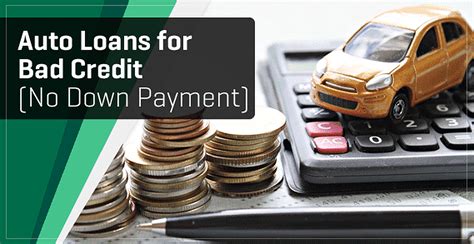Acquiring finance for a car can be a daunting task, especially for individuals with bad credit. However, it's not impossible. With the right approach and understanding of the options available, you can still secure the necessary funding to purchase a vehicle. In this article, we'll delve into the world of car finance for bad credit, exploring the various avenues you can take and the factors you should consider to make an informed decision.
Key Points
- Understanding your credit score and its impact on car finance options
- Exploring alternative lenders and their requirements
- Considering a co-signer or joint application
- Looking into secured and unsecured loan options
- Being aware of the potential risks and higher interest rates associated with bad credit car finance
Understanding Your Credit Score

Your credit score plays a significant role in determining the interest rate you’ll qualify for and whether you’ll be approved for a car loan. In the UK, for example, credit scores range from 0 to 999, with higher scores indicating better credit. A score of 881-960 is considered excellent, while a score below 560 is deemed poor. If you have bad credit, it’s essential to understand the reasons behind it and work on improving your score before applying for car finance.
According to a report by Experian, the average credit score in the UK is around 776. However, for those with bad credit, the score can be significantly lower, making it challenging to secure a car loan at a reasonable interest rate. It's crucial to check your credit report and address any errors or discrepancies that may be affecting your score.
Alternative Lenders and Their Requirements
Traditional lenders, such as banks, often have strict credit requirements, making it difficult for individuals with bad credit to secure a car loan. However, alternative lenders, like online financing companies or specialist car finance providers, may be more willing to consider applicants with poor credit. These lenders typically have more relaxed credit requirements, but this comes at a cost, often in the form of higher interest rates.
Some alternative lenders may require a larger down payment or a co-signer with good credit to secure the loan. Others may offer secured loans, where the vehicle itself serves as collateral, or unsecured loans, which don't require collateral but often come with higher interest rates. It's essential to research and compare the terms and conditions of various lenders to find the best option for your situation.
| Lender Type | Interest Rate | Loan Term |
|---|---|---|
| Traditional Bank | 6.0% - 8.0% | 36 - 60 months |
| Alternative Lender | 10.0% - 20.0% | 24 - 48 months |
| Specialist Car Finance Provider | 8.0% - 15.0% | 36 - 72 months |

Considering a Co-Signer or Joint Application

If you have bad credit, having a co-signer or joint applicant with good credit can significantly improve your chances of securing a car loan. A co-signer agrees to take on the responsibility of repaying the loan if you default, while a joint applicant applies for the loan alongside you, sharing the repayment responsibilities. This can help reduce the risk for the lender and result in a lower interest rate.
However, it's essential to consider the potential risks and implications of having a co-signer or joint applicant. If you default on the loan, it can negatively impact the credit score of the co-signer or joint applicant, damaging your relationship with them. It's crucial to discuss and agree upon the terms and conditions with your co-signer or joint applicant before applying for the loan.
Secured and Unsecured Loan Options
When it comes to car finance, you have two primary options: secured and unsecured loans. A secured loan uses the vehicle as collateral, meaning that if you default on the loan, the lender can repossess the vehicle to recoup their losses. This type of loan often comes with lower interest rates, as the lender has a level of security.
An unsecured loan, on the other hand, doesn't require collateral, but this comes with a higher level of risk for the lender. As a result, unsecured loans often have higher interest rates and stricter credit requirements. It's essential to weigh the pros and cons of each option and consider your individual circumstances before making a decision.
What is the minimum credit score required for a car loan?
+The minimum credit score required for a car loan varies depending on the lender and the type of loan. However, most lenders require a credit score of at least 600 for a traditional car loan.
Can I get a car loan with bad credit?
+Yes, it is possible to get a car loan with bad credit. However, you may face higher interest rates and stricter credit requirements. It's essential to research and compare the terms and conditions of various lenders to find the best option for your situation.
What are the risks associated with bad credit car finance?
+The risks associated with bad credit car finance include higher interest rates, stricter credit requirements, and the potential for repossession if you default on the loan. It's essential to carefully review the terms and conditions before signing any agreement.
In conclusion, getting finance for a car with bad credit requires careful consideration and research. By understanding your credit score, exploring alternative lenders, and considering a co-signer or joint application, you can increase your chances of securing a car loan. However, it’s essential to be aware of the potential risks and higher interest rates associated with bad credit car finance. With the right approach and a thorough understanding of the options available, you can find a car finance solution that meets your needs and helps you get back on the road.



